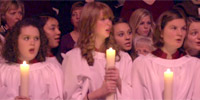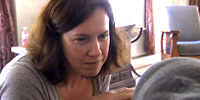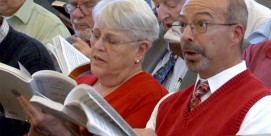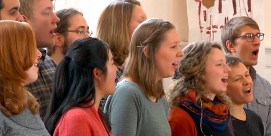 JAN BOOTH (Threshold Choir): Let’s go first into a warm-up song. Let’s do There You Are. Those of you who know the song, try not to look at your music, and those of you who are still learning it, look at it all you want.
JAN BOOTH (Threshold Choir): Let’s go first into a warm-up song. Let’s do There You Are. Those of you who know the song, try not to look at your music, and those of you who are still learning it, look at it all you want.
SARAH STOTT (Threshold Choir): When we sing to a patient, we are sending them love, we are wishing them well on their journey, we are saying we’re all in this together. They are still very much alive until they’re not, and they’re sharing their time with us. They’re going through something that none of us have gone through yet, so in a way they are our teachers, and so we are learning also from them on how to do this thing called dying.
BOOTH: Our members come from lots of different backgrounds, which is one thing I really appreciate about our particular Threshold Choir. That to me is a real richness about our choir. Some people come with some hospice background, or if not, as a hospice volunteer, maybe experience taking care of someone who has died, other people come without any of that, and sometimes maybe with some trepidation about, oh I don’t know if I can do this. For those people who thought I don’t know if I can be there, how can I be there right at the bedside of someone who’s dying and be able to control my emotions, or be able to sing clearly, and many of our members have spoken, those who sing at the bedside, have spoken about that, uh, ability that they found within themselves to be able to be present, it takes some preparation.
When we rehearse, we enjoy the singing part of it, and we enjoy being together. At rehearsal, there’s laughter, there’s fun, there’s a sense of well-being often, the experience of singing, you know, these beautiful songs, physically feels good, right, uh, and then when we’re at the bedside, there’s often a sense of well-being in that exchange between us and the people we’re singing to, there’s a kind of uplift that the music and the words provide.
 STOTT: There’s another thing at rehearsal that we do that’s a really special, experience, is that when people are closer to being able, ready to sing at bedside, because it is a process you need, to learn the music, to be comfortable with the experience, so we set up a chair, um, a lounge chair, so that the people can practice being sung to, and singing to somebody who is about to pass.
STOTT: There’s another thing at rehearsal that we do that’s a really special, experience, is that when people are closer to being able, ready to sing at bedside, because it is a process you need, to learn the music, to be comfortable with the experience, so we set up a chair, um, a lounge chair, so that the people can practice being sung to, and singing to somebody who is about to pass.
Songs we sing speak to people of all religions, races, they speak of grace, and love, and peace, and resting, but at request we will sing other songs. We certainly sing Christian songs, and from other religions as well.
When we come to a facility, usually the three of us will meet here, and . . . we’ll rehearse – just go through who is going to sing what parts to the songs, what songs we’ll likely do
LESLIE KOSTRICH (Threshold Choir): Amazing Grace and Simple Gifts . . .
STOTT: We’ll have a short rehearsal before. We will do a small ritual of centering ourselves as a group to get ourselves present before we go into the room.
Before we enter a room, we don’t know what is beyond the door. We open the door, or pull back a curtain, and we usually don’t know how alert the patient is going to be, so we come in and we introduce ourselves, even if the person is unconscious, because this is their home, we are coming into their home and saying, may we share some time with you?
KOSTRICH: We’d like to sing some songs to you today.
 STOTT: And we would like to sing, would you like to be sung to? And then we have one person who has volunteered to be the anchor for that day, that is what we call the person who is sort of leading the day’s experience of singing with patients, and she intuits what songs would be best at that moment. She will start a song, and the other two, three of us will join in.
STOTT: And we would like to sing, would you like to be sung to? And then we have one person who has volunteered to be the anchor for that day, that is what we call the person who is sort of leading the day’s experience of singing with patients, and she intuits what songs would be best at that moment. She will start a song, and the other two, three of us will join in.
We sing until the anchor decides the song has ended, and then we’ll rest a little bit, because sometimes those poignant pauses between the songs are very precious.
And then the anchor will intuit the next song, and she’ll start singing, and the rest of us will join in, until it’s time to go. And we stand up and say thank you, and we leave.
KOSTRICH: Thank you. It was a pleasure to sing to you and to spend a little time with you.
PATIENT: Thank you very much.
KOSTRICH: Oh, thank you. It’s our pleasure. Take care.
STOTT: We ’ll do a little debriefing after the singing is over, and we’ll just talk to make sure how did we all feel about what we just experienced – musically as well as personally, and then just how are we all doing emotionally? Because it can be very emotional, when we’re with people in such this honest, raw, sacred moment.
’ll do a little debriefing after the singing is over, and we’ll just talk to make sure how did we all feel about what we just experienced – musically as well as personally, and then just how are we all doing emotionally? Because it can be very emotional, when we’re with people in such this honest, raw, sacred moment.
KADIJA ASH (Threshold Choir): It was like each one of them, when we started to sing, became more alert in their breathing.
STOTT: We also make sure we’ll all okay before we drive home. So that’s very important because part of our group and part of bonding is that we care for our singers as well.
Yes, we’re giving to the patients, but it’s a gift to us too, to learn to be centered, to learn to be loving, to learn to just be present with somebody in such a sacred moment.

 JAN BOOTH (Threshold Choir): Let’s go first into a warm-up song. Let’s do There You Are. Those of you who know the song, try not to look at your music, and those of you who are still learning it, look at it all you want.
JAN BOOTH (Threshold Choir): Let’s go first into a warm-up song. Let’s do There You Are. Those of you who know the song, try not to look at your music, and those of you who are still learning it, look at it all you want. STOTT: There’s another thing at rehearsal that we do that’s a really special, experience, is that when people are closer to being able, ready to sing at bedside, because it is a process you need, to learn the music, to be comfortable with the experience, so we set up a chair, um, a lounge chair, so that the people can practice being sung to, and singing to somebody who is about to pass.
STOTT: There’s another thing at rehearsal that we do that’s a really special, experience, is that when people are closer to being able, ready to sing at bedside, because it is a process you need, to learn the music, to be comfortable with the experience, so we set up a chair, um, a lounge chair, so that the people can practice being sung to, and singing to somebody who is about to pass. STOTT: And we would like to sing, would you like to be sung to? And then we have one person who has volunteered to be the anchor for that day, that is what we call the person who is sort of leading the day’s experience of singing with patients, and she intuits what songs would be best at that moment. She will start a song, and the other two, three of us will join in.
STOTT: And we would like to sing, would you like to be sung to? And then we have one person who has volunteered to be the anchor for that day, that is what we call the person who is sort of leading the day’s experience of singing with patients, and she intuits what songs would be best at that moment. She will start a song, and the other two, three of us will join in. ’ll do a little debriefing after the singing is over, and we’ll just talk to make sure how did we all feel about what we just experienced – musically as well as personally, and then just how are we all doing emotionally? Because it can be very emotional, when we’re with people in such this honest, raw, sacred moment.
’ll do a little debriefing after the singing is over, and we’ll just talk to make sure how did we all feel about what we just experienced – musically as well as personally, and then just how are we all doing emotionally? Because it can be very emotional, when we’re with people in such this honest, raw, sacred moment.




